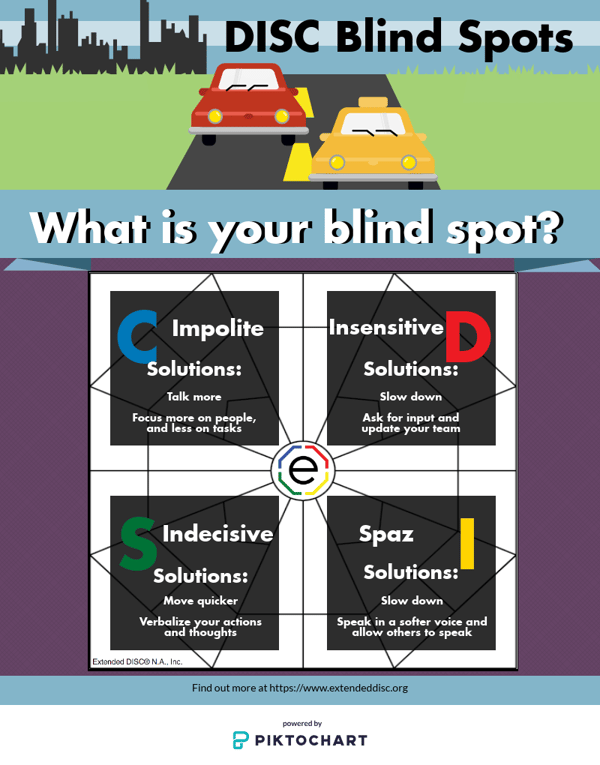Were you ever surprised to hear yourself called "insensitive" because that's not how you would've described yourself? At times, you may feel a disconnect between how you view yourself versus how others view you. Blind spots may stem from this gap in self-awareness.
How you view your behaviors is not always how others view them. When there's a gap between two different views it can cause miscommunication and hinder your interactions. We call this gap your blind spots. Your knowledge of DISC is just one step towards your self-awareness, but it can also help you better understand how others see you. The result could mean removing your blind spots.
How Do Blind Spots Show Up?

DISC focuses on behaviors or how a person acts. Think of the act of doing something as essentially neutral. For example, your department has been assigned a special project to launch your latest product. You're all over it! You're moving fast and taking some risks. The finish line is in sight and the glory of the product launched. However, others see your actions differently. Were you shocked when your boss pulled you aside to tell you to slow down and stop carelessly rushing, or the project will fail? Both sides can agree the end goal is to get the product launched successfully. However, one person sees the other as rushing and not being a team player. The other feels getting the product launched as soon as possible, regardless of input and errors, is a win-win for the team.
How does this disconnect show up? We may have a clear view of how we do things, but we may not realize that others see us differently. We may even make assumptions that everyone operates the same way we do. For example, if you're totally focused on launching the product fast, then everyone else must have the exact same belief, right? Our own DISC style and perceptions give value to the behaviors we observe. Let's look at some examples.
You're So Insensitive: D-style Blind Spots
D-styles prefer to focus on tasks. If you're a D-style, you probably prefer to work quickly and independently. When you're under pressure, you may over emphasize your strengths. In some cases, you get tunnel vision because you're so focused on accomplishing the task. You may not ask for input from others. You may exceed authority because you're focused on completing the task. It may not have occurred to you to check in. As a D-style, you may not even realize you're coming across as insensitive or showing a lack of concern for others.

In your view, you're simply focused on accomplishing the task. Doesn't everyone want to achieve success and keep moving forward? They do, but not always in the same way you do. D-styles prefer to communicate in one direction - you talk and others listen. That's not always the case for the other DISC styles. D-styles are the most independent DISC style. However, recognize how your actions and behaviors affect others. As a D-style, you can continue to achieve great things and accomplish tasks, but be aware of how your actions are viewed by others. Try taking a few extra moments to ask for input, or slow down a little and update your team. In the end, you will find the achievement is even more rewarding.
You're Such a Spaz: I-style Blind Spots

Spaz can have different meanings, but in slang terms it often refers to someone who is impulsive or overly-animated. I-styles prefer to focus on people and emotions. If you're an I-style, you enjoy interactions! You're likely outgoing, talkative, and people-oriented. As with the D-style, you are one of the more individualistic DISC styles. You tend to work quickly and avoid details. However, others may perceive you as careless, impulsive or even a spaz. You think, "why do people see me as a spaz?"
You're slightly bewildered because you're just trying to be engaging. You love interacting with everyone! I-styles prefer to make quick decisions based on gut-reaction and emotions. However, they want results to reflect positively on themselves. I-styles are open, energetic, and friendly. Here you are taking that wonderful positive energy and spreading it out to everyone you meet. Positive experiences with others make for a better team, right? However, the energy and emotional-based interactions may come across to different DISC types in a way you don't anticipate. Your energetic communication style may feel chaotic, frenetic, and yes, like a spaz to others. Consider slowing down, focusing more on information, and allowing others to speak. You may find that the spaz label may no longer be used to describe you.
You're So Indecisive: S-style Blind Spots

Have you ever been called "indecisive" and thought, "I'm not indecisive! I'm just taking the needed time to make sure the decision is the best for everyone!" As an S-style, you're often seen as amiable and a team player. You tend to think of yourself as part of a team, whether it's a work team, family, or a group of friends. Emotions and building relationships are a priority over just completing tasks. You need to consider others who may be involved or impacted. As a more reserved DISC style, you often need more details and time before making decisions.
So when it comes to making decisions, you want to gather all the information, consider the input of others, and then make the decision. However, to other DISC types, your actions can come across as indecisive because you tend to be slower to make decisions. As an S-style, you prefer to listen more than speak, so it's important to verbalize your actions to others. Try moving more quickly. Let people know that you're not indecisive, but rather, focused on making the best decision for people around you. When people have a better understanding of your decision-making process, they may remove the indecisive label.
You're So Impolite: C-style Blind Spots

Are you surprised when someone described you as "distant" or "impolite"? Were you just feeling somewhat shy and reserved when interacting with that person? You preferred to listen and process the dialogue unless there was something valuable to contribute. C-styles are the most reserved of the 4 DISC profiles so that shyness and lack of visible emotions may come across to others as distant or even impolite. As a C-style, do you prefer to work in small groups or even alone, where you can focus on tasks and information? C-styles prefer to talk about data and facts rather than opinions or abstract matters. They can be quieter and less comfortable expressing disagreeing viewpoints. Therefore, you may be quiet, formal, or shy, but realize that can come across to others as impolite, uncaring or distant.
Now that you're more aware of how others see your actions, consider talking up more. Spend a little more time chatting. It won't be comfortable at first, but if you practice with a few people, it will get easier over time. When you are interacting with others, consider focusing on the person rather than facts and figures. Be open to discussion, but don't get hung up on details and numbers. Pushing yourself outside your comfort zone can go a long way to improving how you interact with others and reducing the impolite label.
Use Your DISC Assessment to Reduce Blind Spots
Our DISC assessments can help you identify the blind spots in your DISC style that may be holding you back. The You at a Glance page is just one section of the DISC report you can use to learn more about how others see you. This section is a description of how others are likely to perceive you. Remember, the DISC Assessment presents your natural behavioral style because behavior is something we make appropriate changes to. While the You at a Glance section describes your typical behavior as seen by others, you certainly can modify your behavior to fit the needs of a particular situation or role. It does not take into account your attitudes, skills, experience, etc.
The Open 360 is another tool that can help identify your blind spots. Open 360s can be used in any application where feedback from others is helpful in developing the performance of employees, teams and organizations. The 360 report is based on the answers given to Extended DISC 360 Tools - Open 360 questionnaire. The results indicate the perception of the respondents and should not be assessed without knowledge of the environment. Contact us for more information on the Open 360.
